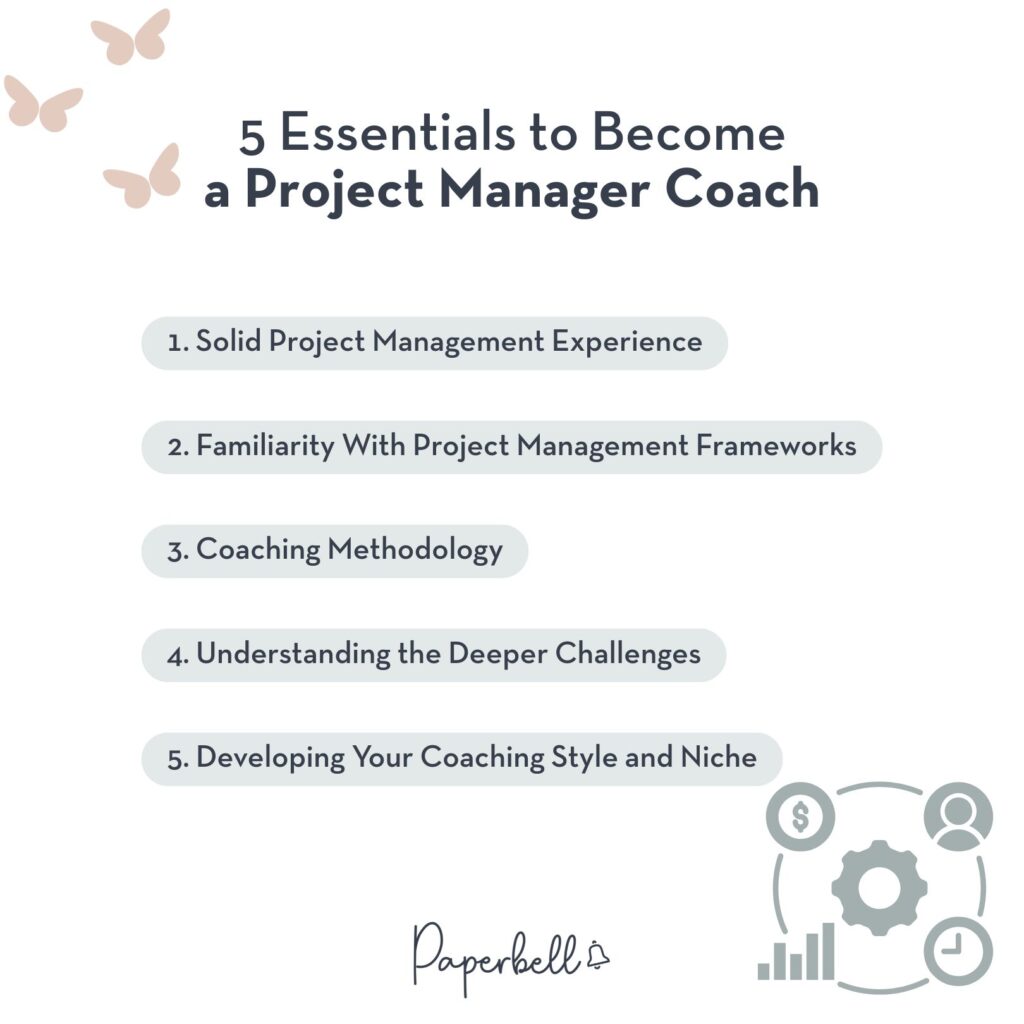Project managers are tasked with leading complex initiatives, juggling timelines, and aligning teams toward shared goals. A specialized coach can help them stay on top of it all.
Whether you’re a coach looking to niche down or a project manager who needs support, this guide walks you through how to get there.
Read on to learn:
- What project manager coaching involves
- When to hire one
- How to become one yourself
What Do Project Manager Coaches Do?
Being a project manager isn’t just about timelines, Gantt charts, or keeping your Asana board color-coded. It’s about managing people, priorities, and pressure all at once.
They can learn frameworks, but project success often depends on everyday choices, like how they handle a team losing momentum or deal with a stakeholder who keeps changing the goals.
A coach can help manage these situations with confidence. Here’s how they typically support project managers:
- Clarifying focus in complex environments: With so many moving parts, it’s easy for project managers to spread themselves thin. Coaching helps them identify what to prioritize, what to delegate, and where their attention makes the biggest impact.
- Improving communication with stakeholders: Whether it’s negotiating expectations, addressing delays, or managing constant changes in direction, a coach can help project managers lead conversations with confidence.
- Making better decisions: From adjusting timelines to handling resourcing issues, coaches help project managers think through decisions more strategically so they can take the right action.
- Managing team dynamics: Coaches provide support for handling everything from low engagement to interpersonal tension, so project managers can lead their teams with empathy and authority.
- Creating space for reflection: Amid day-to-day execution, coaching gives project managers a space to pause, reflect on their approach, and develop stronger habits for leading under pressure.
How Is Project Manager Coaching Different From Leadership Coaching?
While there’s definitely overlap, leadership coaching focuses more on personal growth, vision, and influence across an organization. It’s often geared toward senior roles or long-term career development.
Project manager career coaching, on the other hand, zeroes in on the operational side of leadership: helping someone navigate real-time challenges like scope creep, burnout, shifting priorities, or communication breakdowns.
It’s less about leadership presence and more about showing up effectively as a manager.
When to Hire a Project Manager Coach
There’s no one “right time” to work with a project manager coach, but there are certain signs that someone might benefit from the extra support. Whether you’re getting on a new project or feeling overwhelmed by the current one, a coach can help you find more ease in it.
Here are some of the most common scenarios where project manager coaching can make a big difference:
- You’ve just been promoted and need to quickly level up—not just managing tasks, but leading people and making strategic decisions.
- You’re leading high-stakes or complex projects with lots of moving parts and competing priorities, and you need help to keep things aligned.
- You’re feeling burned out or overwhelmed, constantly reacting instead of leading, and you need support in setting boundaries and regaining focus.
- You’re dealing with tough team dynamics, like disengagement, conflict, or unclear roles on a project, and want guidance on how to address them.
- You’ve mastered the technical side of project management but struggle with other aspects like communication.
Coaching can also be a powerful support system during transitions, whether it’s entering a new company, working under a new leadership structure, or moving from waterfall to agile project management.
Looking for something a little different? Read our guides on:
5 Essentials to Become a Project Manager Coach

This coaching specialty is rooted in practical experience. It’s not something you can wing after completing a project manager coaching certification, though training can help lay the foundation.
To be an effective coach in this field, you need to have lived through the highs and lows of managing projects: missed deadlines, difficult stakeholders, burnt-out teams, impossible expectations, and the workarounds that get one through these challenges.
Here are the essentials for becoming an effective project manager coach.
1. Solid Project Management Experience
To coach others, you need to have experience managing real projects and solving real problems. That doesn’t mean you need to have 20 years under your belt, but it does mean you should:
- Have led full project cycles from scoping to delivery
- Be familiar with cross-functional communication and stakeholder management
- Understand what makes teams productive (and what kills momentum)
- Know how to troubleshoot scope creep, shifting priorities, and conflicting expectations
This firsthand experience is what gives you credibility and empathy as a coach. Your clients aren’t looking for textbook answers; they want someone who understands the messiness of the work and can help them make sense of it.
2. Familiarity With Project Management Frameworks
You don’t need to be a purist or a certified expert in every methodology. However, you should understand the practical applications of the most commonly used frameworks, like:
- Agile: An iterative approach to project management that breaks work into short cycles (sprints) and emphasizes flexibility, collaboration, and continuous improvement. Ideal for fast-moving or evolving projects.
- Scrum: A specific Agile framework that organizes work into time-boxed sprints (usually 2–4 weeks) and includes defined roles like Scrum Master and Product Owner. It emphasizes accountability, team roles, and regular feedback loops.
- Waterfall: A linear, sequential method where each phase (requirements, design, development, testing, deployment) must be completed before the next begins. It’s best suited for projects with fixed scope and clear requirements.
- Kanban: A visual workflow management system that uses boards and cards to track tasks in progress. It helps teams limit work in progress and improve efficiency through continuous delivery.
- Lean: A methodology focused on maximizing value by eliminating wasted time, resources, or effort. It comes from manufacturing and is used to streamline processes and increase customer value.
Beyond the frameworks, it’s also important to understand the why behind them, where they work well, and where they don’t. That way, you can help clients make smarter choices, not just follow processes blindly.
3. Coaching Methodology
Being a coach isn’t about having all the answers. It’s about helping others think critically, reflect on their actions, and build confidence in their decisions.
That means learning how to:
- Ask powerful, open-ended questions
- Listen actively without jumping in to fix
- Guide someone to their own insights through mirroring and paraphrasing rather than directing them
- Recognize limiting beliefs or unhelpful habits and reframe or challenge them gently
If you’re used to mentoring or managing, this shift in mindset is especially key.
4. Understanding the Deeper Challenges
Many project managers turn to coaching not because they don’t know how to manage a timeline, but because they’re stuck on something more personal or interpersonal:
- They’re constantly putting out fire, but never feel like they’re getting ahead.
- They’re unsure how to assert themselves with difficult stakeholders.
- They’re in a new leadership role and dealing with imposter syndrome.
- They’re overwhelmed and struggling to prioritize or say no.
A good coach sees beyond surface-level issues and helps clients make better decisions, shift behaviors, and change how they show up under pressure.
5. Developing Your Coaching Style and Niche
As you build your practice, you’ll likely find a specific kind of client or challenge you’re especially good at helping with. That could be:
- Early-career project managers figuring out their leadership style.
- Tech leads moving into project management roles without formal training.
- High-performing project managers who want to move into program or portfolio manager roles.
- People recovering from burnout who need sustainable systems.
Your niche might also be defined by the industries you’ve worked in or the methodologies you’re most comfortable with. Over time, you’ll develop your own framework or approach that blends coaching skills with your unique background, helping you stand out.
Building Your Project Manager Coaching Practice
Starting a coaching practice means figuring out what you’re offering, how you’ll deliver it, and how to run the business side of things smoothly.
Here’s what you’ll need.
Outcome-Based Coaching Packages
Instead of selling one-off sessions, design packages that solve specific problems. Think about the results your clients are after, then reverse-engineer the structure. For example:
- Help clients ace their first project manager role with a 3-month coaching process.
- Support overwhelmed project managers with a short-term “Project Overhaul” program.
- Offer retainer-style packages for ongoing guidance and accountability.
Make it easy for clients to understand what they’ll get, how long it takes, and what kind of results they can expect.
Price Based on Transformation
You don’t have to charge by the hour. Instead, you can price your packages based on the value you’re providing. If you’re helping someone feel on top of leading high-stakes projects, that’s worth a lot. To find the sweet spot for your rates, you should:
- Look at other coaches or consultants in your niche for reference.
- Offer tiered packages (starter, deep dive, ongoing support) to meet different budgets.
- Avoid underselling your experience—your project management background is a big asset.
Set Up Your Website and Systems
You don’t need a full tech stack or a custom-built site to get started. Paperbell gives you a ready-made, customizable coaching website with landing pages for each of your packages.
Once clients sign up, they will be guided through your automated onboarding flow to sign your contract, pay you, and book you. They will get access to their dedicated client portal to manage their sessions and review key information like past payments.
Paperbell also lets you schedule automated client emails, run surveys, and set up custom one-on-one or group coaching programs with downloadables and pre-recorded materials.
The best part? It’s free with your first client, all features included.
Streamline Your Client Experience
Here’s how you can personalize your clients’ experience once they sign up on your page:
- Send them a welcome email with the next steps.
- Use an intake form to gather key information on their goals, challenges, and background.
- Set expectations upfront about session frequency, communication, and your cancellation policy.
A clean onboarding and coaching process builds trust and keeps your clients engaged.
FAQ
What’s the Difference Between a Project Manager Coach and a Mentor?
A mentor shares advice based on their own experience. A coach helps you find your own solutions through questions, reflection, and skill-building.
How Many Sessions Should I Expect as Someone Hiring a PM Coach?
It depends on your needs and how your coach structures their packages. You can ask about this in your discovery session with them. Some may offer weekly sessions over a few months, while others might focus on monthly check-ins and accountability.
Do I Need Project Management Experience to Become a PM Coach?
Yes, real-world experience in project management is key to guiding clients on their initiatives, whether in a company setting or elsewhere. Most PM coaches have led complex projects themselves and understand the day-to-day challenges their clients face.
How Can I Measure the ROI of Project Manager Coaching?
Look at improvements in the client’s KPIs and other aspects of their work, like decision-making, and team performance. Promotions and new job roles within their field are also great indicators of their growth.










